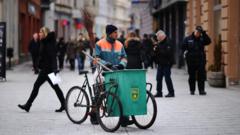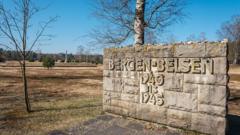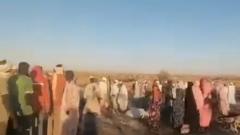Description: "The echo of the Srebrenica massacre still resonates through Bosnia and Herzegovina, as survivors confront divisions that threaten reconciliation."
"Srebrenica Massacre: Deep-Rooted Tensions Persist 30 Years Later"

"Srebrenica Massacre: Deep-Rooted Tensions Persist 30 Years Later"
Summary: "Decades after the devastating Srebrenica massacre, Bosnia and Herzegovina grapples with unresolved grief and stark political divides. Commemorative events reveal ongoing tensions, as some leaders deny the atrocities and evoke memories of the past for political gain."
In July 1995, the horrors of the Srebrenica massacre unfolded when over 8,000 Bosnian men and boys were systematically executed by Bosnian Serb forces, marking the darkest chapter in post-World War II Europe. As part of the ongoing struggle to acknowledge and heal from this tragedy, a poignant play, "Flowers of Srebrenica," premiered at Sarajevo's War Theatre, capturing the deep wounds that remain within Bosnian society even three decades later.
The performance opened with gut-wrenching imagery, as actors unearthed personal belongings – watches and sandals – from the mock soil, eerily reminiscent of countless families still searching for closure regarding their lost loved ones. For the Bosniak community, who largely populate the urban landscape of Sarajevo, the Srebrenica massacre stands as a horrifying reminder of a conflict that both shattered lives and severed communities.
In the face of overwhelming evidence, including convictions handed down to key figures like Ratko Mladić for genocide, many in the Republika Srpska region still deny that the massacre constituted genocide. Instead, nationalist politicians exploit ethnic divisions for their own gain. Selma Alispahić, the lead actress of the play and a former refugee, lamented the ongoing battle for acknowledgment and understanding: “People get tired of proving the truth that's been proven so many times, even in international courts."
The 1995 Dayton Peace Agreement aimed to quell the violence, yet its lasting legacy continues to separate the country along ethnic lines, creating an uneasy coexistence between the Federation, home to Bosniaks and Croats, and the majority-Serb Republika Srpska. Recently, Milorad Dodik, the president of Republika Srpska, has stirred new controversy by challenging national institutions and seeking to create a "reserve police force," sparking fears among communities who remember the violent past.
While the Srebrenica massacre is solemnly remembered in the heart of Sarajevo, public recognition dwindles just a short distance away in East Sarajevo, where the narrative often shifts to emphasize victimhood among Serbs. Saša Košarac, a leading figure in the Republika Srpska government, argued that the focus on Bosniak victims exacerbates societal divisions rather than healing wounds across all communities.
On the eve of significant commemorations, hundreds attended a solemn procession through rain-soaked streets, paying homage to the recently identified victims who were laid to rest at the Potočari Cemetery. Despite pervasive tensions, the arrival of supportive cyclists and runners highlighted the shared grief among those who strive for unity.
Anxiety permeates the atmosphere for many residents, particularly for families of victims like Mirela Osmanović, who work tirelessly at the Srebrenica Memorial Centre but feel increasingly unsettled by the rising ethnic tensions. Reflections from community members evoke fears of reverting to a time of violence, underscoring the urgent need for reconciliation and an enduring sense of security.
For Dodik, stoking these tensions serves as a political strategy, yet for those still healing from Srebrenica, the consequences of such maneuvers prolong their suffering and hinder the search for collective peace and remembrance. The scars of the past remain hauntingly present, illustrating the complexity of moving forward in the shadow of history.

















